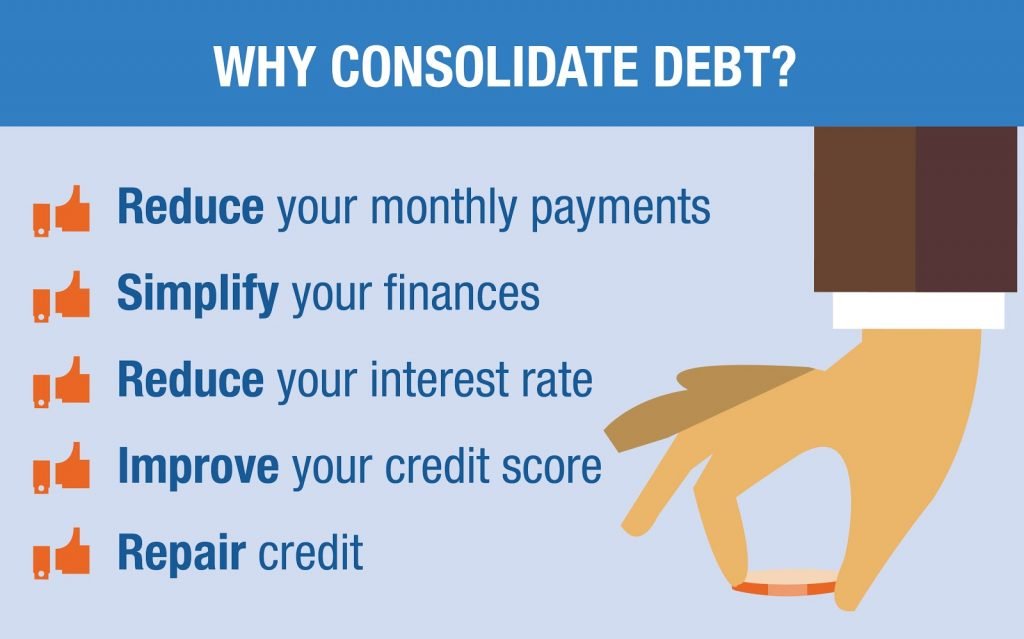Total debt consolidation loan is the go-to solution for anyone juggling multiple debts and looking for a simple, manageable repayment plan. By rolling all your debts into one, this option can unlock lower interest rates, streamline your monthly payments, and give you a clear timeline to becoming debt-free.
With a total debt consolidation loan, you can take control of a confusing financial situation and create a single strategy for repaying what you owe. This approach is usually best for borrowers with several debts—like credit cards, personal loans, or medical bills—who want to reduce stress and potentially save money on interest, all while avoiding the chaos of dealing with several different lenders at once.
Total Debt Consolidation Loan Overview
Total debt consolidation loans are financial tools designed to help borrowers combine multiple existing debts into a single, manageable loan. By doing so, individuals or households can simplify their repayment process, often securing a lower interest rate or extending their repayment period for more affordable monthly payments. This solution is particularly suitable for those juggling various unsecured debts, such as credit cards, personal loans, or medical bills, and feeling overwhelmed by multiple due dates and interest rates.
The main appeal of a total debt consolidation loan lies in its ability to streamline finances, reduce the emotional stress of debt management, and potentially save money over time. Borrowers can focus on one payment each month, which makes budgeting easier and reduces the risk of missed payments that can negatively impact credit scores.
Definition and Core Purpose of Total Debt Consolidation Loan

A total debt consolidation loan is a new loan used to pay off several smaller debts. The core purpose is to combine all qualifying debts under one umbrella, ideally with more favorable terms. This approach helps borrowers by reducing the complexity of multiple payments and, in many cases, lowering the average interest rate, thus making debt repayment more efficient.
Typical scenarios where this solution is applicable include individuals with several high-interest credit cards, multiple personal loans, or when monthly payments are becoming unmanageable due to the number of creditors involved. The key benefits are simplicity, potential interest savings, improved credit over time, and psychological relief from constant financial juggling.
Main Benefits for Borrowers

Borrowers who utilize a total debt consolidation loan can experience a range of benefits. These advantages extend beyond the financial, impacting overall well-being and future opportunities.
- One fixed monthly payment, making budgeting easier.
- Potentially lower overall interest rates compared to previous debts.
- Reduced risk of late or missed payments due to payment consolidation.
- Improved credit score over time if payments are made promptly.
- Lower stress levels and increased confidence in managing personal finances.
Key Features of Total Debt Consolidation Loan

Total debt consolidation loans share several core features that distinguish them from other financial products. Understanding these features helps borrowers make informed decisions and compare options effectively.
| Feature | Description | Typical Value | Impact on Borrower |
|---|---|---|---|
| Interest Rate | The rate applied to the consolidated loan balance. | 6% – 25% APR | Lower rates can result in substantial savings over time. |
| Repayment Period | The length of time allowed to pay off the loan. | 2 – 7 years | Longer terms mean lower monthly payments but possibly more interest paid overall. |
| Secured/Unsecured | Whether collateral is required. | Both types available | Secured loans often have lower rates but higher risk for borrowers. |
| Origination Fees | Fees charged to process the loan application. | 0% – 8% of loan amount | Impacts total cost of the loan; higher fees reduce net loan proceeds. |
| Monthly Payment Structure | Fixed or variable payments based on loan terms. | Mostly fixed | Predictable payments help with budgeting. |
Differences Between Secured and Unsecured Consolidation Loans, Total debt consolidation loan
Secured debt consolidation loans require collateral, such as a home or vehicle, which lowers the lender’s risk and usually results in lower interest rates and higher borrowing limits. However, failing to repay a secured loan can lead to the loss of the pledged asset. Unsecured loans do not require collateral but typically come with higher interest rates and stricter credit requirements.
Typical Loan Terms, Interest Rates, and Repayment Periods
Most total debt consolidation loans offer repayment periods between 2 and 7 years, with interest rates varying widely based on creditworthiness, collateral, and lender policies. Borrowers with strong credit and stable income may qualify for rates as low as 6% APR, while those with less favorable profiles may see rates above 20%. Fixed monthly payments are standard, supporting consistent budgeting and planning.
Eligibility and Requirements
Lenders use a set of established criteria to assess eligibility for total debt consolidation loans. Meeting these standards increases the chances of approval and may secure better terms.
Standard Criteria for Loan Qualification
Most lenders evaluate the following factors before approving a debt consolidation loan:
- Credit score: Higher scores signal lower risk and qualify for better rates.
- Income stability: Sufficient and consistent income assures lenders of repayment ability.
- Debt-to-income ratio: A lower ratio indicates a manageable level of existing debt relative to income.
- Employment status: Full-time, stable employment is preferred.
- Collateral: For secured loans, proof of ownership for the pledged asset is required.
Documentation Required for Application
Applicants need to provide various documents to verify identity, income, and debts. Proper documentation streamlines the process and demonstrates financial responsibility.
- Government-issued ID (driver’s license, passport, etc.)
- Proof of income (pay stubs, tax returns, bank statements)
- Statements from all debts to be consolidated
- Proof of residence (utility bill, lease agreement)
- For secured loans, documents related to the collateral asset
Factors That Affect Approval Chances
Several factors can influence the likelihood of approval for a total debt consolidation loan. Awareness of these variables can help applicants strengthen their profiles before applying.
- Credit score: Higher scores improve approval odds and loan terms.
- Stable income: Demonstrated ability to repay is critical.
- Low debt-to-income ratio: Indicates manageable current financial obligations.
- Employment history: Longer, stable work history is favorable.
- Type and value of collateral (for secured loans).
- Number and types of existing debts.
- Recent credit inquiries and new lines of credit.
Final Wrap-Up
Wrapping it all up, a total debt consolidation loan can be a game-changer if you’re looking for a straightforward way to tackle overwhelming debt. By understanding the ins and outs, considering your options, and making smart choices, you set yourself up for better financial health and peace of mind in the future.
Detailed FAQs
Will a total debt consolidation loan hurt my credit score?
Initially, applying for a loan might cause a small dip in your credit score, but consolidating your debts and making on-time payments can improve your credit over time.
What kinds of debts can I include in a total debt consolidation loan?
Most unsecured debts like credit cards, medical bills, and personal loans can be included. Secured debts, such as mortgages or auto loans, typically cannot.
How long does it take to get approved for a total debt consolidation loan?
Approval times vary, but you can usually expect a decision within a few days to a couple of weeks, depending on the lender and your documentation.
Are there fees involved with total debt consolidation loans?
Yes, some lenders charge origination fees, prepayment penalties, or other costs. Always read the terms carefully before accepting an offer.
Can I use a total debt consolidation loan if I have bad credit?
It’s possible, but you might face higher interest rates or need a co-signer. Some lenders specialize in working with people who have lower credit scores.
